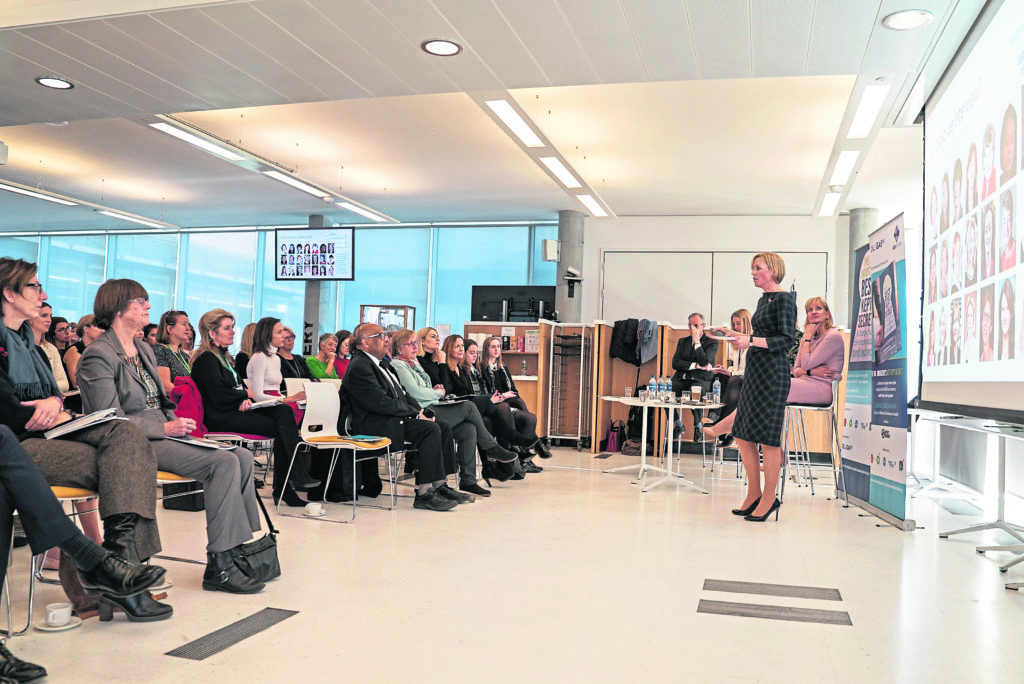
Oil worker and author Katy Heidenreich believes the oil and gas sector needs to robustly “tell the story of our industry” to attract today’s best and brightest young women.
An operations optimisation manager with Oil and Gas UK (OGUK) and author of a new book designed to encourage girls looking to pursue a career in the sector, Ms Heidenreich said the north-east oil and gas sector should be casting its net wider concerning the exciting career options in energy.
The book, entitled “The Oil Industry’s Best Kept Secret: A Book Full of Inspiration and Advice”, includes testimony and profiles of high-flying women across the sector and north-east.
Ms Heidenreich said: “Young people across Aberdeenshire need to be inspired about how exciting our industry is. Many people across the north-east of Scotland don’t know our industry and how valuable it is. I would like to see more businesses reaching schools deeper in the region.
“I get that it’s easier to reach out to schools within the boundaries of the city, but I would ask that every company in this sector pledges to give some of their staff time to travel further into the shire and tell the story of our industry.”
Ms Heidenreich, who also served as commercial manager for global oilfield services giant Schlumberger for nearly a decade, made the case that the oil sector needs “new technology and news ways of doing things” with fresh talent essential to that message.
She said: “It’s really important that people understand that our industry is going to be around for a long time to come. Access to clean energy is good for the whole world, but the population is going to continue to grow, economies are going to continue to grow and thrive and energy plays a very important part in that.
“Oil and gas will still give us more than half our energy needs in over 40 years’ time, so it’s a really important industry.”
As many sectors attempt to shift to a more gender-balanced workplace, oil and gas is no different.
With her extensive experience in the industry, Ms Heidenreich is well placed to comment on how the influx of women into the sector has made it forward-thinking, innovative, while opening it up to fresh solutions.
Ms Heidenreich wants to see more women taking senior roles and feels now is the time, and as such, will keep making the case that the oil industry can be at the forefront of gender work and pay.
As she puts it: “The results speak for themselves.”
She said: “I think the business case for a more balanced team is now really well understood. Companies who have a more balanced board and who have more women on their board perform better.
I think that that goes from the top all the way down an organisation – more balanced teams, more diversity of thought, bring much better answers.
“We continue to be at the forefront of solving technical challenges and we’ve got to come up with more innovative ways of working, and the more diverse a company is the better solution they’re going to come to.”
Yet, the oil manager also knows more has to be done to level the playing field at school.
The outmoded idea that boys are more suited to certain subjects while girls are suited to others is a persistent concern in education and modern culture more broadly.
Ms Heidenreich said: “All science, technology, engineering and maths (STEM) sectors struggle to attract girls. That’s a societal issue that we have. Irrespective of the industry, it falls on all of us to work harder to get more girls and to change perceptions about STEM careers and say: they’re not just for boys, they’re absolutely for girls too.
“It’s about keeping your options open and finding more about an industry that you don’t necessarily know anything about. My advice to every boy and girl out there is look at the oil industry as one of your options. You can have a great and long career here.”
Asked how optimistic she is that young people, and especially young women, can affect a culture change to bring about a more balanced workforce, Ms Heidenreich added: “Young people are growing up faster today and I think part of it is technology. Their access to information is unprecedented.
“That, in part, is what’s really exciting. So many today do have some sort of device and access to information, which means you can get the right information to them much more easily.
“They also have a much stronger voice. They challenge, they ask ‘why should I accept that?’, so I think that we’re in a much stronger place with young people today who certainly seem to have more confidence and know they have a voice.”
“It is difficult when you’re talking to girls who’re 15, 16 because of what is going on in that whole teenage point in their lives.
“It’s a big deal for them that this sector looks male dominated but it needs more of us women in industry to say: so what? It’s not an issue, it doesn’t matter, you don’t get treated differently.
“When I was young in my career and I went offshore, I was often only one of a few women and it was daunting. But everyone wanted to make sure that I had a successful
trip while I was there. No one wanted you to view it as difficult, and went out of their way to make sure that everything was going to be okay.
“The message is: please don’t let that put you off because actually we’re past that now, especially in the North Sea. We are part and parcel of the industry now.
“We need to dispel that myth about Big Oil that it’s all hard hats and coveralls. It’s not that at all.”
Recommended for you
